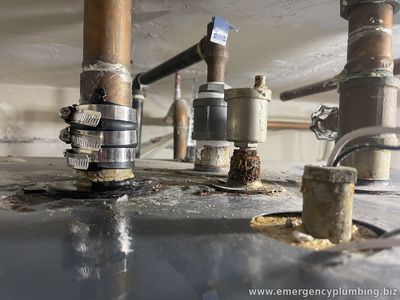Common Causes of Water Heater Rust and How to Prevent It
Your water heater is one of the hardest-working appliances in your home. With proper care, it can serve you for up to 20 years. However, rust is one of the leading causes of premature water heater failure, turning durable tanks into brittle, leaky messes. At Emergency Plumbing, we’re here to help you understand the common causes of water heater rust and, more importantly, how to prevent it.
Why Does Rust Occur in Water Heaters?
Rust is a natural reaction when metals like iron come into contact with water and oxygen. While water heaters are designed with built-in safeguards against rust, these measures can fail over time, leaving the tank vulnerable. Let’s explore the top causes of water heater rust.
1. Failed Anode Rods
Anode rods are your water heater’s first line of defense against rust. These steel rods, coated in aluminum, magnesium, or zinc, attract sediment and corrosion-causing elements, protecting the tank.
What Happens When They Fail?
When anode rods wear out, the tank becomes the next target for rust. Without routine inspections and timely replacements, this protective barrier disappears, leading to rapid tank deterioration.
Prevention Tip:
• Have your anode rods inspected every 6 to 12 months.
• Replace anode rods every 2 to 3 years to extend your water heater’s lifespan.
2. Hard Water and Sediment Build-Up
Hard water, rich in minerals like calcium and magnesium, can wreak havoc on your water heater. Over time, these minerals settle at the tank’s bottom, creating an insulating layer that reduces heating efficiency and accelerates wear.
Hard water can also contain dissolved metals such as zinc, iron, and manganese, which increase the risk of rust.
Signs You Have Hard Water:
• Stubborn spots on glasses and dishes.
• Dry, itchy skin and brittle hair.
• Stiff or rough laundry.
• Metallic or sulfur-like odors in water.
Prevention Tip:
• Install a whole-house water softener to remove hard water minerals.
• Flush your water heater every 6 to 12 months to eliminate sediment.
3. Damaged Glass Liners
Water heaters are lined with a thin layer of glass to prevent water from touching the steel tank. Overheating caused by excessive sediment or lack of maintenance can crack this protective barrier, exposing the tank to rust.
Prevention Tip:
• Flush the water heater regularly to remove sediment.
• Schedule annual maintenance to check for signs of overheating or glass liner damage.
The Importance of Regular Water Heater Maintenance
Scheduling routine maintenance for your water heater can help you avoid costly repairs and extend its life. Here’s what maintenance should include:
• Flushing the Tank: Removes sediment and improves heating efficiency.
• Inspecting and Replacing Anode Rods: Protects the tank from corrosion.
• Testing the System: Ensures all components are working properly.
Benefits of Flushing Your Water Heater
Flushing your water heater offers multiple advantages:
• Improved Efficiency: Eliminates insulating sediment, reducing energy usage.
• Extended Lifespan: Limits corrosion, helping anode rods and tanks last longer.
• Better Water Pressure: Removes buildup that blocks water flow.
• Lower Energy Bills: A more efficient water heater means reduced energy costs.
Protect Your Water Heater with Emergency Plumbing
At Emergency Plumbing, we specialize in water heater maintenance and rust prevention. Our team serves homes across North Shore and Northwest suburbs of Chicago IL, and beyond, offering reliable services for:
• Plumbing
• Drains & Sewers
Whether you need a system flush, anode rod replacement, or help choosing a water softener, we’re here to help.
Contact us today to schedule maintenance or get a free quote. Protect your water heater and enjoy long-lasting performance with Emergency Plumbing.


Comments
Post a Comment